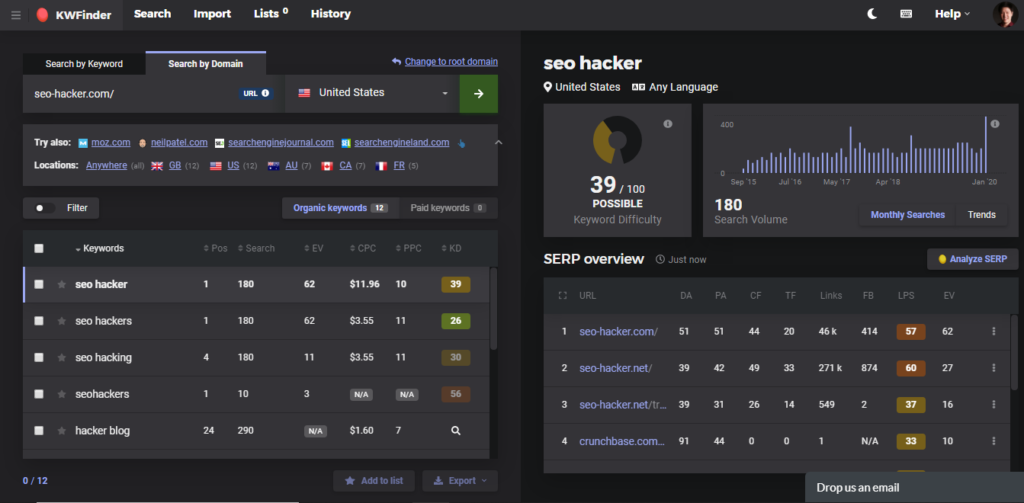The Best Competitor Keyword Analysis Guide
Competitors are a big part of the SEO industry. It’s a zero-sum game where one wins, another loses. This is why SEOs and webmasters need to keep up with the times and adapt to any situation. Aside from resources, we can find from authoritative sources, one of the best locations for us to find effective strategies and content that works is from the competitors that are ahead of us. So, how do we analyze our competitor’s keywords and use them to our advantage?
Determining your search competitors
The first step to analyzing your competitor’s keywords is to determine which competitors matter. The reason why you can’t use your real-world competitors since some of them does not have great search visibility.
A good rule of thumb to determine your search competitors is to check the websites ranking for your target keywords on the first page, even if they’re not your real-world competitors.
It’s also important for you to remember that there will be instances where you will encounter websites that encompass multiple niches. So, don’t panic when you’re seeing brands/names that you don’t know ranking for your coveted keywords.
Finding search competitors is easy enough since you just need to search for your target keywords in Google or you can even use tools such as Mangools’ KWFinder that shows the top 10 results for keywords you search for. Lastly, take note of competitors that rank for other search real estate such as featured snippets, knowledge graphs, etc.

Gathering competitor keywords
Once you’ve listed down your competitors, it’s now time to gather the keywords they’re ranking for. This is easy enough to do since there are a lot of tools in the market that can do this in a matter of seconds.
After gathering your competitor’s keywords, you should organize them into two categories:
Current keyword rankings
These are the keywords that your website is already ranking for alongside your competitors. More often than not, you’ll only focus on the competitors that are ahead of you in rankings, but it’s also important for you to take note of other competitors that rank lower than you since they can still overtake you in the future.
Compiling your competitor’s current keywords and their rankings will also help you put things in perspective. You’ll be able to see which of your keywords intersect with theirs and be able to prioritize the keywords that matter the most.
New keyword opportunities
Aside from putting things into perspective and knowing which keywords to prioritize, compiling your competitor’s keywords also allows you to spot new keyword opportunities that you’re currently not pursuing.
Your efforts shouldn’t stop with overtaking your opponents in ranking for keywords you both share, you should also aim to widen the reach of your website in search. Instead of manually looking for keywords in tools and SERPs, it’s easier for you to find relevant and beneficial keywords through analyzing your competitor’s current keywords. This allows you to save time and energy while gaining extremely helpful results.
How to use the analysis to your advantage
So, after compiling the list of keywords and organizing them, what should be the next step? Analyzing your competitor’s keywords isn’t the end, you should also analyze anything and everything that makes their pages better than yours. That includes:
Content difference
The first thing you should check is how their page’s content differs from yours. It’s easy to augment content and make it better than it was before. But it’s difficult to gauge how a competitor’s content performs better than yours even if you take pride in producing content that’s high-quality, informative, and comprehensive.
The best of us can be overcome by pride, especially if we put in so much effort and energy to produce the best content we could create then seeing it underperform or seeing your competitors still rank better even if you know your content is better.
A good rule of thumb in gauging your competitor’s content is determining what they included in their content that you don’t have.
We had a similar experience with one of our clients when we created a landing page with high-quality, informative content but it wasn’t ranking as high as we wanted it to. So, we checked our competitor’s pages that were ranking better than us, and even though we had a longer and more comprehensive content, we lacked foundational information for our topic which was providing the definition of the term (keyword) we were talking about and its advantages. Even though we had better content, we actually lacked what the users wanted and needed to see. When we augmented our content, we immediately overtook our competitors.
Sometimes it’s just a matter of lacking some things which could be easily mitigated, but other times, it’s a matter of lacking quality, information, and comprehensiveness, which is more difficult to solve.
Onsite difference
Aside from the content, the next thing you should check is the competitor’s onsite efforts. We’ve already written a guide to onsite optimization, but here are the factors you should be checking:
Some of these may seem like outdated factors for you, but fully optimizing all these factors make a difference. Additionally, internal linking plays a massive part in fully optimizing your website since it improves crawling and navigation by the spiders. The more your content is seen, the faster the changes get noticed by Google.
Offsite difference
Lastly, when you’ve checked and taken note of all the differences between your pages, the last thing you should check are the competitor’s backlinks. Does their page have a higher number of quality backlinks than yours? Do they have more backlinks from reputable sources? Then maybe you should level-up your link building.
Since onsite and content factors are easily spotted and changed, we usually don’t have any problems with them. But, when it comes to link building, you can only see it if you intentionally check your competitor’s backlink profile.
One high-quality link can make the difference between rank 1 and rank 2-10. So, it would be best for you to be wary of your competitor’s backlink profile and strive to be better than them. You can even use their own backlink profile to spot new link building opportunities.
Key takeaway
It’s as simple as that. I’ve seen long-form content about competitor keyword analysis in search, but it doesn’t have to be that way. Competitor Keyword Analysis is simple and straightforward enough. You just need to know how to gather the necessary information, compile and organize, and analyze and determine how you can improve your own strategies.
Do you regularly check your competitor’s search performance? Is analyzing their keywords beneficial for you? Let me know in the comments below!
